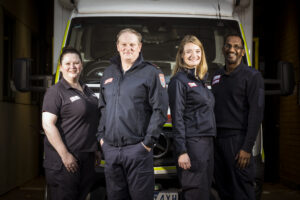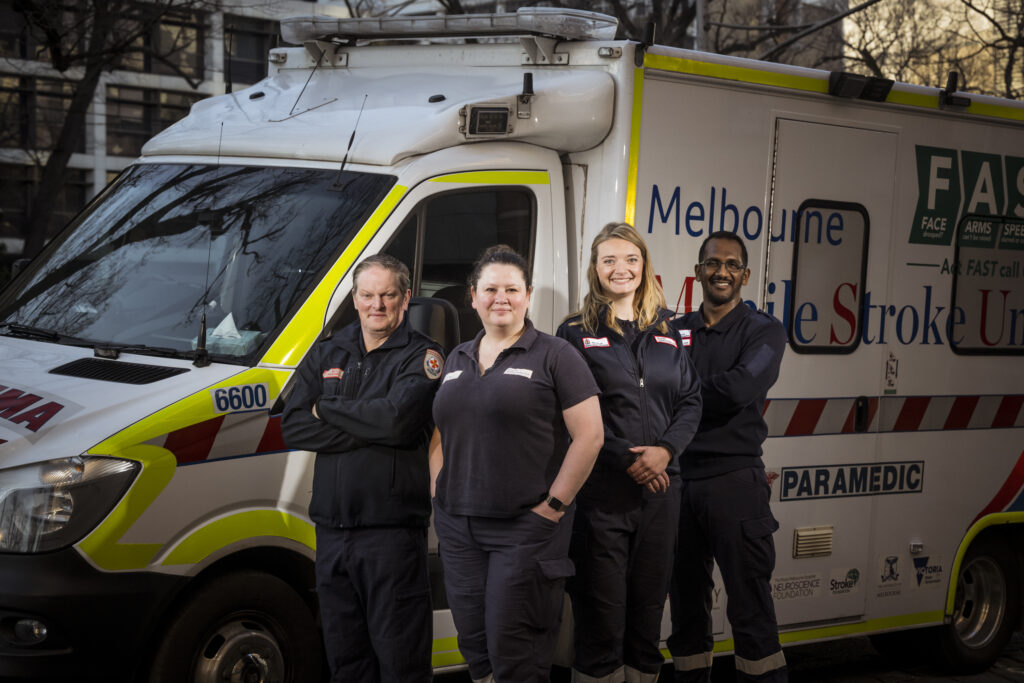National Stroke Week 2022
In honour of National Stroke Week, we would like to introduce you to four health professionals dedicated to treating stroke….FAST…on Melbourne’s mobile stroke unit (MSU).
The theme of this year’s Stroke Week is ‘Act fast to enjoy precious moments’, so it seems appropriate that we meet two couples who share precious moments – as partners in life and on the road as first responders. Each is clearly aware that they have an essential role, increasing the chances of their patients living meaningful lives, post-stroke.

From left to right: Skye Coote, Rowan Coote, Alexis Near, Vignan Yogendrakumar. Photograph by Chris Hopkins.
Skye Coote (left) is a stroke nurse practitioner and nursing team lead on the MSU. She’s also the senior project manager for clinical education with the Australian Stroke Alliance. Skye’s partner, Rowan (second from left) is a MICA paramedic and often sees Skye on the road when both are called to attend a suspected stroke.
Before we talk about your careers, please tell us you fell for each other when your eyes locked while pushing a gurney through Emergency.
SC: Oh ok. So now the story is going to sound completely corny, but yes we did. He brought a patient (not a stroke patient) into the ED where I was working at about 3am. I just stared at him while he handed over the patient thinking how lovely he was and how I just knew he was supposed to be in my life.
I understand that sometimes you are both sent to the same jobs. Skye, you’re on the mobile stroke unit and Rowan, you’re a mobile intensive care paramedic (MICA) with Ambulance Victoria. Tell us about a memorable stroke patient you both attended.
SC: We got called by an initial paramedic crew for a lady who was found unconscious, but with obvious weakness on one side. Row, as a MICA paramedic, was also there given how unwell this lady was.
Unconsciousness is not common in stroke, and is usually caused by very severe strokes, so it was important that we diagnosed this lady quickly, as she might have needed specialist stroke care that wasn’t available at her closest hospital.
However, because she was unconscious, we couldn’t safely perform her CT brain scan with her lying flat on her back. So Rowan and our MSU MICA paramedic made the decision to place a breathing tube in to keep her safe during the CT. This procedure takes some time, so it was a little longer than normal before we could scan her. However, because of the scan, we were able to see that this lady had a large blood clot in her brain blocking blood flow. The MSU team treated her with a powerful clot busting drug and then took her to a specialist stroke centre where they successfully removed the clot from her brain.
So while we were a little longer on scene stabilising this lady, overall her time to diagnosis and treatment was much faster than if she had gone to the closest hospital only to be transferred to a higher acuity centre. It was great working together on this case as we had complete trust in each other and we both knew and respected the importance of each other’s roles.
Rowan, if you could share one important message during National Stroke Week, what would it be?
RC: I would have to say that the MSU is a fantastic resource for Melbourne. As a paramedic, I know that until the MSU arrived, there has been little that we could do for patients with stroke other than get them to hospital quickly. But seeing paramedics be part of team that can now diagnose and treat patients outside their home is a real game changer.
For all of my paramedic colleagues, I would encourage them to request the MSU to any patient you see with stroke. The MSU can treat patients faster than most hospitals which can improve outcomes.
Skye, we know that stroke treatment needs to be delivered as soon as possible after a stroke – ideally within one hour. You’ve seen many, many stroke patients at what must be a pivotal time, when their lives could change forever. If you could share one important message, what would it be?
SC: Learn the signs of stroke and call 000 without delay.
If you or a family member have any signs of stroke (FAST: facial droop, arm weakness on one side, slurred or difficult speech), call an ambulance. Please don’t make an appointment to see your GP, or wait to talk to your family, or go rest to see if it gets better. Every 15 mins treatment is delayed adds an extra month of disability. This could be an extra month in rehab, away from your family and friends.
The paramedics and the hospital are there to look after you, so please call them for help urgently. The team can’t help you, unless you make the call.

From left to right: Rowan Coote, Skye Coote, Alexis Near, Vignan Yogendrakumar. Photograph by Chris Hopkins
Neurologist, Vignan Yogendrakumar (right) works on the mobile stroke unit as well as on the stroke ward at the Royal Melbourne Hospital. His partner, Alexis Near (second from right) is a specialist neurological nurse practitioner who is joining the mobile stroke unit team. Both Alexis and Vignan are originally from Canada and have been living and working in Australia since January 2021.
OK, so tell us how you two met. Were there lights and sirens?
VY: We met at the hospital while Alexis was nursing on the neuroscience ward and I was a resident physician in neurology. Apparently, Alexis had caught her colleagues talking about me and how I was a nice guy. Hearing this, Alexis decided that it would be in her interest to introduce herself. So, upon seeing me at the nursing station later she did just that. I liked her friendliness, and so a couple months later when she had finished working on our Neuroscience ward, I asked her out and from there, it is history. I would say there were lights and sirens.
Vignan, why were you attracted to neurology as a career and have you seen meaningful advances in stroke care since you began practising?
VY: My interest in neurology primarily stems from the early interest in stroke medicine I developed during medical school. I partook in my first stroke code as a third-year medical student and I enjoyed the acuity of care, combined with the time sensitive and complex decisions required from the care team. I knew, almost immediately, that this was the type of work I wanted to do as part of my career.
Upon starting my neurology training in Ottawa, Ontario, I was very fortunate to develop strong relationships with stroke neurologists who would mentor me for the next six years of my residency. During this time, I developed a strong interest in clinical research and made the decision to actively integrate research into my day-to-day practice as a clinician-investigator. As such, to complete my training in stroke, I chose to pursue a PhD in acute stroke neuroimaging under the supervision of Prof. Bruce Campbell, a leading stroke researcher, who is recognised both nationally and internationally, for his expertise in acute stroke care.
Alexis, how does a neurology nurse practitioner differ to other nurses and what unique skills do you hope to bring to the care of Australian stroke patients?
AN: As a nurse practitioner, I am equipped with a wider skill set with which to engage with patients. Specifically, I can assess, diagnose, order tests and prescribe medications for patients. With my neurology nurse practitioner role on the Mobile Stroke Unit, I will be working as a member of the first responder team, which includes the doctor, a radiographer and two paramedics to deliver comprehensive care to patients experiencing a stroke (or a suspected stroke). The nurse practitioner and the doctor work together to obtain the patient history, assess the patient, discuss the diagnosis and plan, and implement care.
Though nurse practitioners have an extended scope of practice that may seem similar to a doctor’s, one of the beautiful things about the NP role is that the care is provided though a nurse’s perspective. It is often associated with having a more holistic approach to the patient, an increased consideration and exploration of finer details, and in particular, of issues relating to quality of life (for example, considering how medication side effects may affect a patient). The roles are very complementary, and with my skills I hope that I can serve to provide the best possible care, outcomes and experiences to all the patients we encounter.
Have you worked together in the past? How do you think you’ll get along, working in the cramped, high-pressured cabin of the mobile stroke unit? Alexis, are you going to be OK, taking orders from the neurologist?
AN: Yes we have! We make a pretty good team in both work and home-life, and I have no concerns at all about how things will go on the MSU. In fact, I am excited to work with Vignan. We are both good communicators and rather calm. I also think that this is such a neat way for us to make memories together while we are in Australia.
As for taking orders from my husband, I am very OK with this. He’s just like any other doctor I’ll be working with. Funnily enough, I think he may be more worried about me regularly asking him questions about his decision-making. Maybe check in with us again in a few months and we’ll see if our answers have changed!
Alexis, if you could share one important message during National Stroke Week, what would it be?
AN: I would like to encourage everyone to have a very low threshold for calling 000 if they feel like they might be having (or observing in someone else) symptoms of a stroke. It is much better to be overly cautious than to play it cool and wait in these situations, because time is so crucial in influencing the success of stroke treatment and overall recovery. If something doesn’t feel right, do not delay getting on the phone to 000. Every minute counts.
I have seen some amazing cases where a patient has had a serious stroke, expedient treatment is provided due to the swift action being taken, and the patient makes a complete recovery in a matter of a few days. It is amazing, wonderful and exciting that we can do so much for strokes now, but the time aspect is so important.
Vignan, after 15 months on the wards and the road, treating stroke in Australia, what has been your most telling moment?
VY: The moments that I remember the most have been those when I have worked with young people who have suffered a stroke. Because of the similarities in age, it hits closer to home. As a result, it reminds me to keep perspective of the important things in life and provides a clear reminder of why we do this type of work.
Learn more about National Stroke Week 2022
National Stroke Week is coordinated by one of our seven principal partners, the Stroke Foundation. Learn more about this important event by visiting their website here.